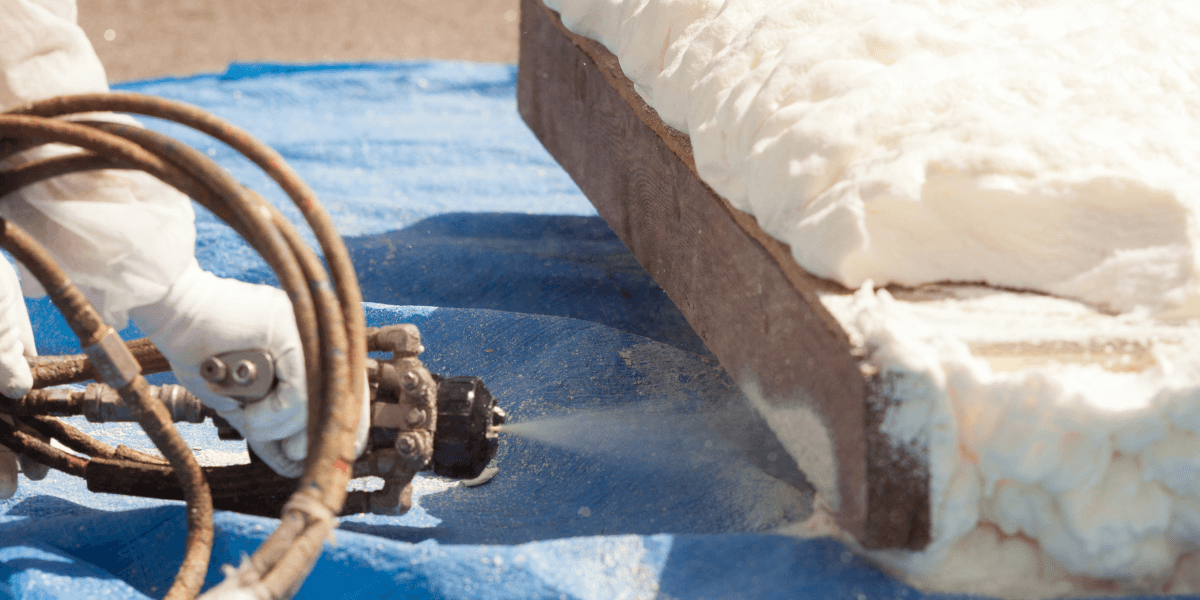


Spray foam insulation can be a wonderful investment for any project, whether it's for new construction or redoing your existing roof. This cost-effective roofing solution provides better insulation than any other product in the market today, making it a popular choice for businesses. Without using extra products or resources, spray foam performs as an effective insulator. However, there are additional benefits to having it installed on your roof.
Continue reading to learn more about the reasons why you should consider spray foam for your commercial roof, as well as its various types.
Spray foam roofs are incredibly easy to install as they can be installed practically on any roof at any time without causing any disruption to your business. Spray foam roofs are installed fast, typically in one day, in contrast to traditional roofing systems, which might require several days or weeks to install. It also involves a minimum amount of tools and work, making it a better choice for your commercial roofing system.
Spray foam insulation offers a higher R-value compared to many significant roofing insulation systems. The R-Value measures the ability of a substance to withstand harsh weather and heat flow while providing insulation against extreme temperatures. The greater the value, the more insulation it provides, resulting in lower energy bills.
Spray foam roofs have a long lifespan, lasting longer than any other roofing system in the market due to their ability to withstand harsh weather conditions. They also require minimal repairs throughout their lifetime. If you find some cracks or holes in your roof, you can easily take care of it all by yourself. All you have to do is cut around the damaged area, blot it dry with a towel or rag, caulk the hole, and smooth it out. A spray foam roof should last for a good 10 to 20 years before needing to be recoated, making it a very cost-effective solution to your commercial roofing needs.
When your roof has been spray-coated, you won't need to completely replace it as you would with a typical roof; instead, you'll just need to add a fresh layer of coating to keep your roof in good condition. This makes it a very effective and affordable option.
See Also: Everything to Know About Spray Foam Roofs and Its Dry Time
To foam the roofs, a truck equipped with spray foam equipment is used. Two 55-gallon drums inside the truck contain the two chemicals used to make the spray foam, referred to as Side A and B. The chemicals are heated and pressured before being delivered via hoses to a spray gun connected to the lines. Next, they are mixed together and react to form the foamed substance at the gun. When gassed, this substance expands 30 times its original size, forming a solid sheet large enough to cover an entire roof. The coating installer works in tandem with the foam installer to make sure that the roof is perfectly coated.
Spray foam roofs, when properly installed, can last for at least 30 years. However, during this time, your spray foam roof might need a few repairs due to normal wear and tear. Thus, it is always advised to use high-quality materials to guarantee a long lifespan.

The two main varieties of polyurethane foam available today are closed cells and open cells. The best defense against rain and water puddles that storms might leave on the roof is closed-cell foam. The lack of air spaces, however, means that it doesn't offer much insulation. Although it is not waterproof, open cell foam insulates against being exposed to the elements. In contrast, open-cell provides better insulation and is good for roofs that have been exposed to various elements.
Extruded and expanded polystyrene foams are both less expensive alternatives to polyurethane foam. Extruded polystyrene is inexpensive, lightweight, and simple to work with, but it does not offer much insulation and might not be the ideal option for withstanding adverse weather conditions. On the other hand, expanded polystyrene foam has a high R-Value, indicating more insulation. The only drawback is that it is heavy and harder to work with.
Polyisocyanurate foam has the highest R-value of all other varieties of spray foam. It is considered the most expensive type of foaming material, but it is also the best insulator and is waterproof. It has a high insulating value since it is constructed of two components, polyisocyanurate, and polyurethane. Compared to other foam varieties, it is also more durable. However, it's crucial to remember that this form of insulation is not suggested for outdoor use as it is flammable. When installing polyisocyanurate foam on your commercial roof, you must consider integrating fire breaks or an ignition barrier with it for safety.
Spray foam roofing is excellent for commercial roofs. Not only is it energy efficient, inexpensive, and requires little maintenance, but it also has several additional advantages that will save you both time and money. Spray foam roofing also offers you the opportunity to prolong the life of your roof. With proper installation performed by a professional contractor, it may even last a lifetime, proving it a great alternative to other roofing systems.
See Also: Polyurethane Foam Insulation: What Are Its Benefits?
Are you looking for a professional commercial roofing contractor in Southern California? Applied Roofing Services can assist you with all your roofing needs. With years of experience handling commercial and industrial projects with utmost efficiency and professionalism, we specialize in providing the highest quality spray foam roofing installation, repair, and maintenance for your commercial roofs. Call us at 714-632-8418 for a free estimate.